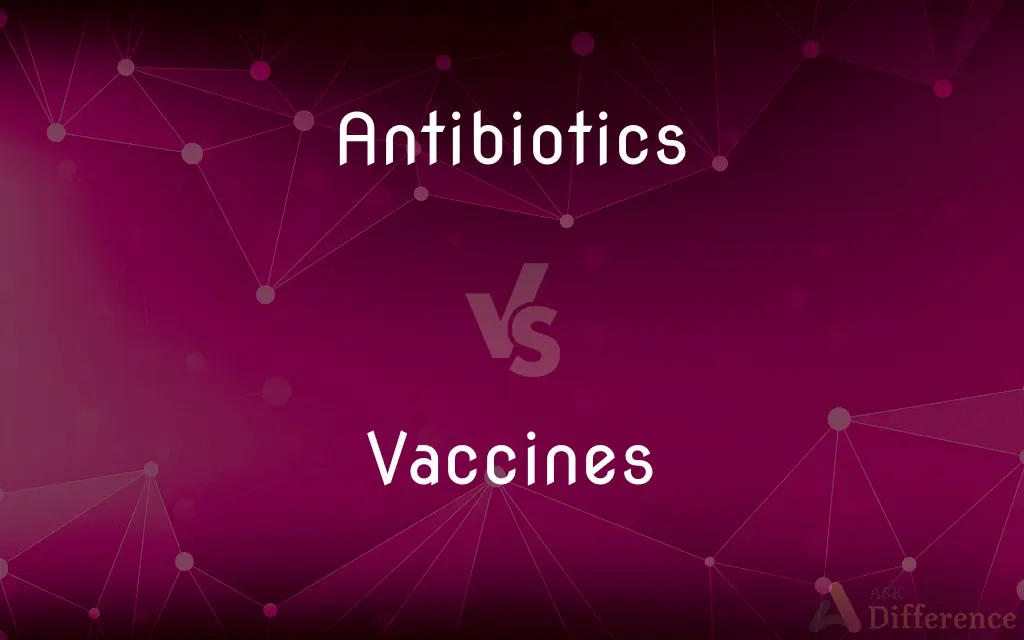Antibiotics vs. Vaccines — What's the Difference?
By Tayyaba Rehman — Published on January 14, 2024
Antibiotics are drugs used to treat bacterial infections by killing or inhibiting bacteria, while vaccines are biological preparations that provide immunity against specific diseases, usually viral.

Difference Between Antibiotics and Vaccines
Table of Contents
ADVERTISEMENT
Key Differences
Antibiotics are medicinal drugs used to treat bacterial infections by killing or inhibiting the growth of bacteria. They are ineffective against viruses. On the other hand, Vaccines are biological preparations that stimulate the immune system to recognize and combat pathogens, particularly viruses.
The role of Antibiotics is primarily therapeutic, used after an infection has occurred. In contrast, Vaccines are preventative, administered before infection to build immunity and prevent the onset of diseases.
Antibiotics work by targeting various bacterial structures or processes, while not affecting the host's cells. Vaccines, however, introduce a weakened or inactivated form of a pathogen, or parts of it, to train the body's immune system.
Overuse or misuse of Antibiotics can lead to antibiotic resistance, a significant global health concern. Vaccines do not contribute to resistance but require periodic updates to remain effective against evolving pathogens.
Antibiotics are usually administered when a specific bacterial infection is diagnosed. Vaccines are part of public health programs for widespread immunization against common infectious diseases.
ADVERTISEMENT
Comparison Chart
Purpose
Treat bacterial infections
Prevent specific diseases, mostly viral
Mechanism of Action
Kill or inhibit bacteria
Stimulate immune response to a pathogen
Role in Health Care
Therapeutic, post-infection
Preventative, pre-infection
Resistance Concerns
Can lead to antibiotic resistance
Do not lead to resistance, but need updates
Administration Criteria
Upon bacterial infection diagnosis
As part of immunization programs
Compare with Definitions
Antibiotics
Drugs that treat bacterial infections.
The doctor prescribed antibiotics for her strep throat.
Vaccines
Biological preparations that prevent infections.
The measles vaccine provides long-lasting immunity.
Antibiotics
Can be broad-spectrum or targeted.
He was given broad-spectrum antibiotics to treat the infection.
Vaccines
Administered before exposure to a disease.
Travelers often receive vaccines before visiting certain countries.
Antibiotics
Used to combat bacterial diseases in humans and animals.
Antibiotics have significantly reduced the mortality rate from bacterial infections.
Vaccines
Often contain weakened or inactivated parts of pathogens.
The flu vaccine is updated annually to match circulating strains.
Antibiotics
Ineffective against viral infections.
Antibiotics cannot cure the flu.
Vaccines
Crucial in preventing viral diseases.
Vaccines have significantly reduced the incidence of childhood illnesses.
Antibiotics
Medications that kill or stop bacterial growth.
Antibiotics are ineffective against the common cold.
Vaccines
Stimulate the immune system against pathogens.
Vaccines have eradicated diseases like smallpox.
Antibiotics
A substance, such as penicillin or erythromycin, produced by or derived from certain microorganisms, including fungi and bacteria, that can destroy or inhibit the growth of other microorganisms, especially bacteria. Antibiotics are widely used in the prevention and treatment of infectious diseases.
Vaccines
A preparation of a weakened or killed pathogen, such as a bacterium or virus, or of a portion of the pathogen's structure, that is administered to prevent or treat infection by the pathogen and that functions by stimulating the production of an immune response.
Antibiotics
Of or relating to antibiotics.
Vaccines
A preparation from the cowpox virus that protects against smallpox when administered to an individual.
Antibiotics
Of or relating to antibiosis.
Vaccines
(Computers) A software program designed to detect and stop the progress of computer viruses.
Antibiotics
Destroying life or preventing the inception or continuance of life.
Vaccines
Plural of vaccine
Antibiotics
Plural of antibiotic
Common Curiosities
Are vaccines effective immediately?
Some provide immediate protection, while others require time to build immunity.
How do vaccines work?
By stimulating the immune system to recognize and fight pathogens.
What are vaccines?
Biological preparations that provide immunity against diseases.
What leads to antibiotic resistance?
Misuse and overuse of antibiotics.
What are antibiotics?
Medications used to treat bacterial infections.
Can antibiotics treat viral infections?
No, they are ineffective against viruses.
How do antibiotics work?
By killing bacteria or preventing their growth.
Are vaccines safe for everyone?
Most are, but there are exceptions for certain health conditions.
Can I take antibiotics as a preventive measure?
No, they should only be taken to treat bacterial infections.
Do antibiotics have side effects?
Yes, they can cause various side effects like allergic reactions or digestive issues.
Can antibiotics cure all bacterial infections?
Most, but some bacteria can be resistant.
Can vaccines cause the disease they're preventing?
No, they contain weakened or inactive components, not causing the disease.
Do vaccines provide lifelong immunity?
Some do, while others require booster shots.
Are there vaccines for bacterial diseases?
Yes, like the vaccine for tuberculosis.
Why are vaccines important for public health?
They prevent the spread of infectious diseases and reduce healthcare costs.
Share Your Discovery

Previous Comparison
Glutamine vs. L-Glutamine
Next Comparison
Baseband Transmission vs. Broadband TransmissionAuthor Spotlight
Written by
Tayyaba RehmanTayyaba Rehman is a distinguished writer, currently serving as a primary contributor to askdifference.com. As a researcher in semantics and etymology, Tayyaba's passion for the complexity of languages and their distinctions has found a perfect home on the platform. Tayyaba delves into the intricacies of language, distinguishing between commonly confused words and phrases, thereby providing clarity for readers worldwide.












































